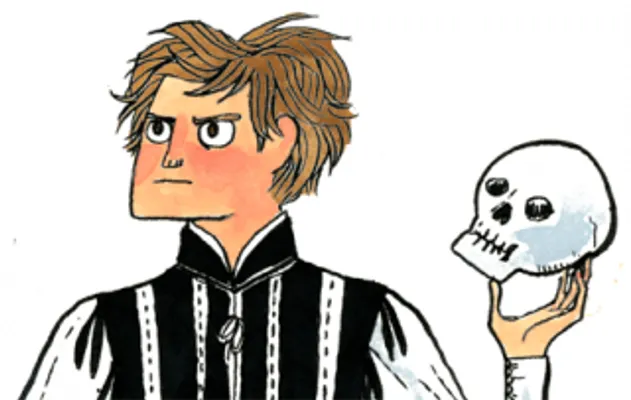Essay Prelude
In societies throughout the ages, humans have fallen prey to their flaws. Kingdoms have risen and fallen due to those flaws, or, rather, flawed individuals. William Shakespeare typifies this in his play, Hamlet, during which each of the characters warred with their ‘fatal flaw’ or hamartia. I focused my collection of six poems around this central theme. However, I also touched upon the theme of loyalty, and included the motifs of mortality and death, deceit, and incest.My poem, “The Tarnished Garden,” from the perspective of Gertrude, especially exemplifies this. The poem begins with an emphasis on Gertrude’s faithfulness to King Hamlet, shown through the use of allusion. Throughout the poem, Gertrude is tempted to “Leave [her] tender garden,” as she is being seduced by Claudius. In the climax, she does leave her garden, and by doing so she sets events into motion, thereby turning the violets in her garden into rue and columbines.
I addressed the theme of Hamartia in my poem, “The Beast of Revenge,” from the perspective of Hamlet. Throughout the poem, he struggles with his hamartia of uncertainty. He doesn’t know who he can trust, and if what he is doing is wrong or right. Also, alluding to his “To be or not to be” soliloquy, Hamlet struggles with the uncertainty of life after death. The poem encroaches on the theme of loyalty through Hamlet’s relationship with his good friend Horatio.
The theme of loyalty is addressed in the poem, “A Friend Most True,” from the perspective of Horatio. The scene being when Hamlet lay dying, the poem shows not only the loyalty between the best of friends, but also the characters’ struggle with death and what lies beyond. Horatio also doesn’t want to be left alone, mostly due to his hamartia of following others, while not necessarily thinking on his own, much like Ophelia does.
Ophelia’s poem, “A Lily Drove Mad,” focuses on her battle with madness and uncertainty. While she loves her father, she cannot break from his control, and when she finally does, after his death, Ophelia doesn’t know what to do. She tries to speak on her own, without her father’s guidance, but it all comes out wrong and distorted. As a result, she is labeled as ‘mad,’ but as the poem continues, Ophelia discovers that being mad isn’t truly a bad thing, for madness is truth. If she can see the truth, then it is the others in her society who are wrong and insane, not her. She doesn’t just see the truth in the events happening around her, but the truth of the people around her as well. But for most, that truth is something they’d rather remain hidden.
One such person is Claudius. He is deceitful, incestuous, and manipulative, distorting the truth to his favor. If the truth of his past were to come out, he would lose all he holds dear, all the power he has gained over the course of the play. He would lose his wife, whom he seduced into his bed, and his crown, which he sacrificed his own brother to obtain. My poem, “The Deadly Shadow,” focuses mainly on Claudius’ transition into the tyrant which we see during the play. The poem begins by highlighting Claudius’ discontent with the people around him, especially his jealousy toward Hamlet. But in the climax, Claudius decides that he will no longer sit around doing nothing while his brother gets all the fame. So he takes action, destroying his brother and setting events into motion that shape the nature of Hamlet.
My final poem, “The Demon Within,” shows the consequences of Claudius’ actions, as it is from the perspective of King Hamlet. Throughout the poem, the King, having been brutally murdered by his brother, chastises himself for his desire of revenge. King Hamlet sees the effect his words have had on his son, blames himself for his Prince Hamlet’s actions.
In William Shakespeare’s masterpiece, Hamlet, the characters battle with their flaws, and it is these flaws that shape them. It makes them different, and separates them from everyone else. And just as these characters must go to war with their own flaws, their own selves, we too must battle with guilt, and other such flaws in real life. It is these flaws that define us, and these flaws who make us who we are.
Join Qfeast to read the entire story!
Sign In. It is absolutely free!


